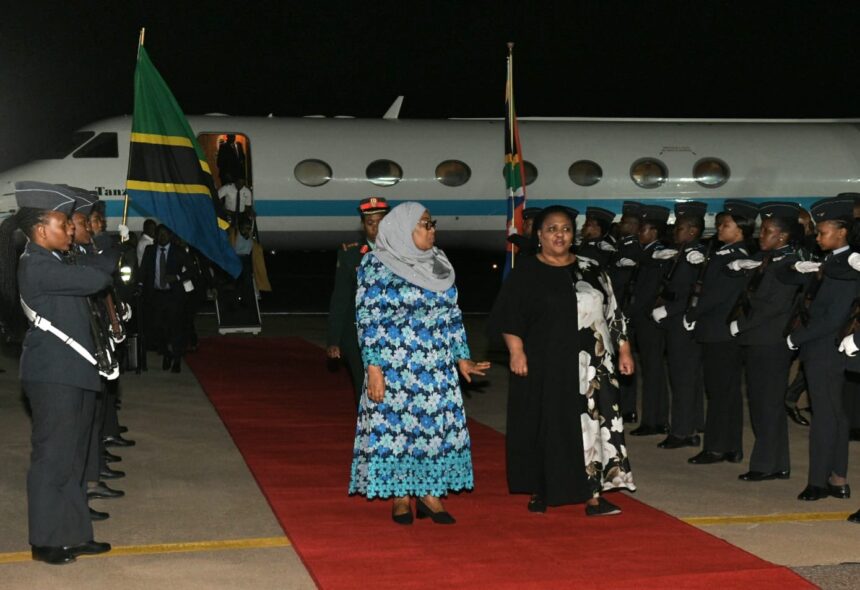Today, various images have surfaced across social media platforms depicting Her Excellency President Samia Suluhu Hassan’s arrival at the Waterkloof Air Force Base in Pretoria, South Africa. Her visit marks Tanzania’s engagement in the 15th BRICS Summit, where South Africa holds the current chairmanship.
The BRICS coalition, composed of Brazil, Russia, India, China, and South Africa, was established with the aim of collectively asserting global leadership in trade, defence, technology, markets, and finance. Originally known as BRIC, the group later expanded to include South Africa in 2010 and became BRICS.
Notably, BRICS represents a formidable counterbalance to Western powers and institutions like the United Nations, IMF, and World Bank. Projections suggest that by 2050, BRICS could command the world economy. Presently, the BRIC countries control a significant portion of the global landmass (26.7%), 41% of the population, 25% of economic output and a combined GDP of $25 trillion.
Tanzania’s presence at the BRICS Summit holds critical significance, given the current global political landscape characterised by conflicts such as the Russia-Ukraine situation, volatile oil prices, dollar scarcity, and technology disruptions across sectors like finance and transportation. This juncture presents an opportune moment for Tanzania to partake in the BRICS summit, as it aligns with a series of strategic steps the nation is undertaking to reduce reliance on external economies.
For instance, Tanzania has initiated measures to lessen dependency on the dollar for trade with key partners. A recent development on July 8, 2023, announced that Tanzania and India would conduct trade using their respective currencies. This significant step underscores efforts to minimize dollar dependency in international trade and enhance trade relations. With India being a major trading partner, this shift could potentially boost economic ties between the two countries.
The dominance of the dollar in global trade, particularly in commodities like oil, fertilizers, seeds, and essential goods, renders nations vulnerable to economic challenges. The scarcity of dollars in some regions, as currently observed in parts of Africa, has led to inflated oil prices. Tanzania’s initiative to diversify from the dollar aligns with trends seen in Russia and India, both prominent BRICS members, as they move away from dollar reliance (e.g., the Rupee Rubble Mechanism). The eventual aim of BRICS is to establish a joint currency, reducing reliance on the dollar altogether.
Participation in the BRICS Summit offers Tanzania a broad platform for expanding trade, defense, and financial horizons. Given Tanzania’s existing trade and diplomatic ties with all BRICS nations, President Samia Suluhu’s involvement in the summit provides a unique opportunity to strengthen these relations. Future prospects might witness agreements similar to the India-Tanzania trade arrangement, using local currencies. President Samia Suluhu’s intent to enhance economic diplomacy is evident in her attendance, thereby amplifying her commitment through practical engagement.
The BRICS bloc is an educational platform for Tanzania to navigate international trade intricacies. Tanzania’s recent decision to establish a gold reserve holds strategic significance. Nations like China and Russia have utilised gold as an alternative to the dollar since 2012, acknowledging its stability. By building its gold reserves, Tanzania positions itself favourably for future economic resilience. The fact that central banks now hold a substantial portion of global gold reserves further highlights its importance.
The BRICS Summit in South Africa holds immense potential for Tanzania to engage with African leaders. With the summit theme “BRICS and Africa: Partnership for Mutually Accelerated Growth, Sustainable Development, and Inclusive Multilateralism,” President Ramaphosa’s invitation to all African leaders underscores the opportunity for collaboration. President Samia Suluhu’s presence not only facilitates discussions on sectors like agriculture, employment, health, technology, and security but also positions Tanzania as an investment destination. Tanzania’s substantial investments in agriculture, tourism, energy, mining, and transportation can benefit from exposure on such a global stage.
In summary, Tanzania’s participation in the BRICS Summit signifies a strategic move toward economic diversification, reduced dependency on the dollar, and enhanced diplomatic ties. The summit provides an avenue for President Samia Suluhu to engage with BRICS members, fostering economic and diplomatic cooperation. Moreover, it aligns with Tanzania’s ongoing efforts to fortify its economic standing and secure future growth prospects. As the BRICS coalition emerges as a powerful economic force, Tanzania’s proactive involvement stands to catalyse its economic transformation and global recognition.


